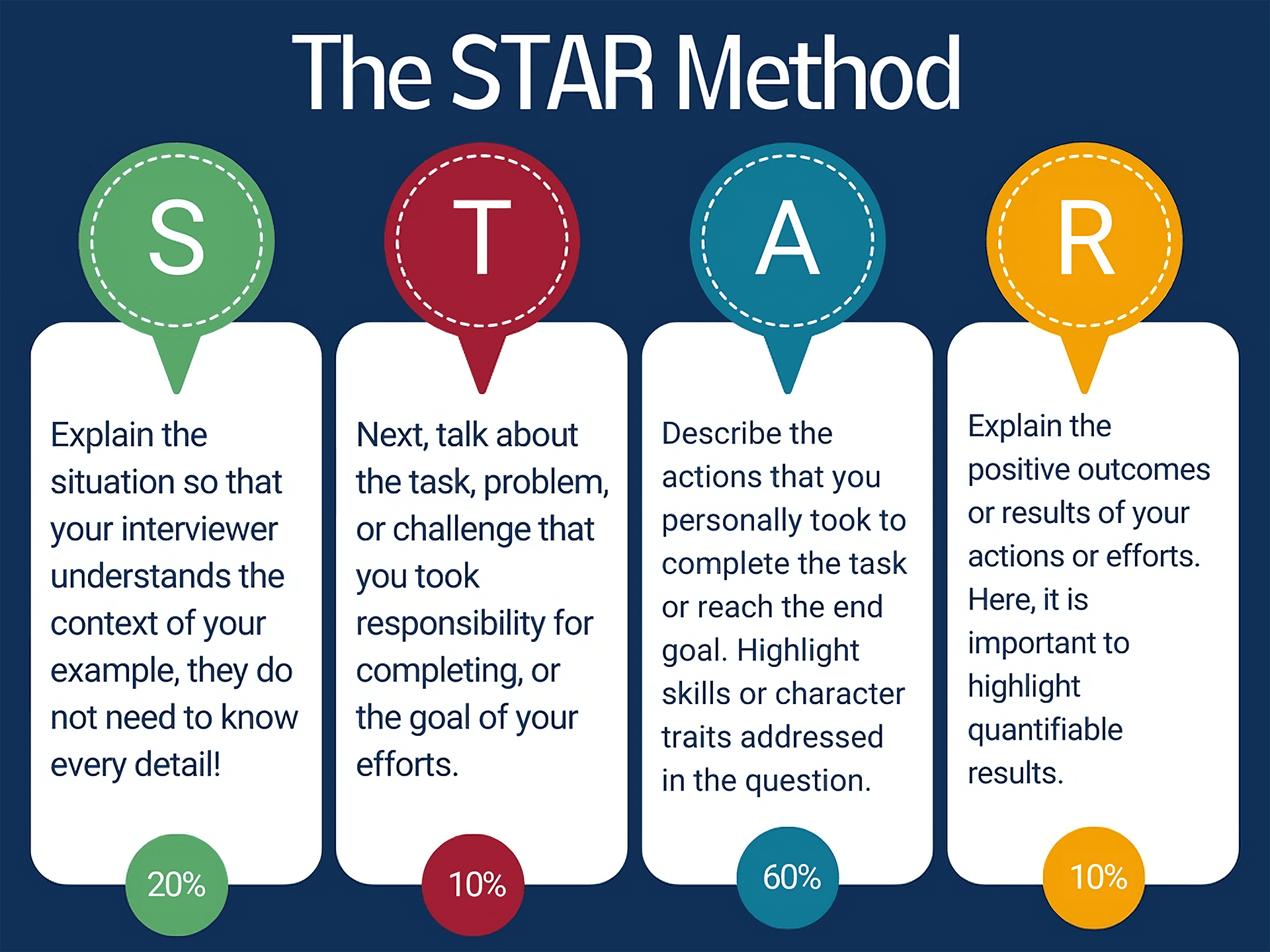Situational interview questions show how applicants could behave in certain work-related scenarios. As opposed to behavioral questions, which question past experiences, situational ones present a candidate with questions in a hypothetical sense meant to determine problem-solving, decision-making, and an overall fit to the position and corporate culture. It is, therefore, important to get prepared for such questions, which give you an avenue to show how well you think critically and adapt to different situations. Situational interviewing questions focus on how you handled any professional situation in the past and how you will fare when handling hypothetical scenarios in the future. In this informative write-up, we will answer interview questions about dealing with stressful situations. We will also provide examples, and tips that will help you ace your interviews.
What You Must Know about Situational Interview Questions?
Situational interview questions usually begin with a "What would you do if." or "How would you handle it?" type of scenario. They place candidates in imaginary work situations and then ask them to describe how they would react. Interviewers use these questions to assess how the candidate thinks, their values, and how they cope with various workplace situations.
Common Situational Interview Questions
Examples of common questions are:
- If you feel that a coworker of yours is not able to cope with the load, what would you do?
- How would you handle an instance of disagreement with the supervisor on any project?
- Can you describe how you would approach a situation where a client is unhappy with your service?
- What would you do if you had multiple deadlines approaching but limited resources?
- How would you act if a team member was not pulling one's weight in a group project?
Strategies for Answering Situational Interview Questions
You can improve your response to situational interviewing questions by considering the strategy options below:
1. Use the STAR Method
The STAR method is a very effective framework you can use to structure answers. Here's how to apply it:
Situation: Set the scene by describing the situation.
Task: Describe your responsibility or the task in which you were engaged at that time.
Action: Mention the action taken to address that situation.
Result: Inform them about the results of what you did, and what happened in the process.

2. Keep Cool and Composed
When faced with situational questions, maintain a calm and composed demeanor. Taking a brief pause before answering allows you to organize your thoughts and craft a clear, well-articulated response. This approach showcases emotional intelligence, thoughtfulness, and professionalism, ensuring your answers are relevant, concise, and effectively address the situation being presented during the interview process.
3. Be Honest and Original
Present your strengths genuinely while staying truthful about your skills and experiences. If you encounter an unfamiliar situation, openly admit it and share how you would seek guidance, learn, or adapt. Employers appreciate honesty, self-awareness, and a proactive mindset, as these qualities demonstrate your integrity, willingness to improve, and ability to handle challenges effectively.
4. Practice Common Scenarios
Practice answering situational questions aloud or with a trusted friend to boost your confidence and clarity. Rehearsing allows you to refine your responses, ensuring they are well-structured and flow naturally. This preparation conveys professionalism, poise, and readiness, leaving a strong impression on potential employers during the interview process.
Examples of Situational Interview Questions and Responses

Following are more examples of situational interview questions with accompanying effective responses:
1. Question: "How would you handle a dispute with a coworker?
Answer: "If I disagreed with anyone in my team, first understand their point of view by giving them equal opportunity to express themselves. Later, I would put forth my point of view with respect, and further, I suggest finding common ground or some compromise that would be advantageous to both parties."
2. Question: "What will you do if you have many deadlines but not all the resources available for you?
Answer: "To handle such a situation, I first prioritize urgency and importance. I'll evaluate which of them carry more weight regarding our goals and will relate the resource constraints to my manager as I try to see if my team can help in one way or another."
3. Question: "How would you feel when a client is not satisfied with your service?"
Answer: "I would like to take up any issues that clients might have head-on. I would listen to them without interrupting their problems, acknowledge feelings, present possible solutions, and make them feel appreciated in the process."
4. Question: "How would you react if a member of your team was not contributing effectively to a group project?
Answer: “I would first seek to understand any challenges they might be facing by having an open conversation with them. If they were struggling with specific tasks, I'd offer my assistance or suggest reallocation of responsibilities within the team.”
Common Situational Interview Questions by Industry
Industry 1: Healthcare
Q: How to Prepare for Situational Interview Questions?
Preparation means familiarizing yourself with the common scenarios in healthcare settings. Reread your job description to pick out the key skills and competencies the job requires. Consider events in the past where you have demonstrated the relevant skills and practice how to describe these events using the STAR method (Situation, Task, Action, Result).
Q: How Important Is Empathy in My Answer?
Empathy is key in clinical settings. As you respond to situational questions, let your interviewer know that you can understand how patients may feel or their concerns. If you were asked how you would treat a frightened patient, for example, put an emphasis on how reassuring and supportive you can be.
Industry 2: Technology
Q: Can I give examples from my academic projects or internships?
If you don't have direct professional experience, you can refer to academic projects, internships, or volunteer work. Situational questions often ask about problem-solving and interpersonal skills, so relevant examples from any context can be useful.
Q: What kind of scenarios am I likely to be asked about in technology interviews?
You can expect scenarios on:
- Technical problem-solving: For instance, how you would resolve a critical issue during a project.
- Team collaboration: For example, how you would work with team members who have different approaches.
- Managing around tight deadlines: For instance, managing many tasks under pressure.
- Unclear requirements: For example, dealing with ambiguous project specifications.
Industry: Education
Q: Can I include examples from my student teaching or volunteer work?
Yes! If you do not have direct professional experiences, you can borrow from your student teaching placements, internships, or even volunteer experiences in schools. Situational questions quite often burrow into problem-solving and interpersonal skills; hence, examples from other contexts can be quite helpful.
Q: How can I reflect flexibility in my responses?
If there is a question that requires some change to take place, mention how you would adjust the teaching strategies or classroom approach to suit students' needs or situations that may not go as anticipated. Also, include specific examples of how you handled curriculum changes or how you dealt with unforeseen hitches during lessons.
Conclusion
You would have learned a lot from the information provided above. We have been able to show you how to answer interview questions about dealing with stressful situations. We have equipped you to answer the tough questions with ease by using any of the methods discussed above, including the STAR method and others. When next you have a situational interview to attend, you can trust this write-up to help you prepare better for it. Situational interviews can help showcase your problem-solving skills and how well-experienced you are. You should consider the following strategies, and you will be in an excellent position whereby you amaze the possible employers and prove that you fit their teams.





